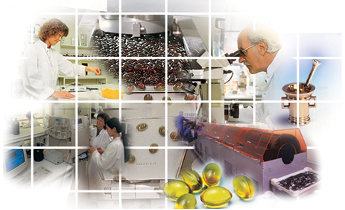What is vitamin B12?
Vitamin B12 is called cobalamin. It is named after the trace mineral cobalt, which is part of the vitamin. It is soluble in water as well as other vitamins in the vitamin B group. Vitamin B12 is absorbed into the blood from the small intestine, but only if the  vitamin has been encapsulated in a protective accessory protein called "intrinsic factor", which is produced in the stomach.
vitamin has been encapsulated in a protective accessory protein called "intrinsic factor", which is produced in the stomach.
After absorption some of the vitamin B12 is deposited in the liver, which under normal conditions contains 1-2 mg vitamin B12. After use vitamin B12 is excreted into the bile, half of which is recycled. This means that deficiency of vitamin B12 in the diet can take a long time to show up.
There are four variations of vitamin B12. They include cyanocobalamin which is the most common form used in dietary supplements, hydroxocobalamin that mainly is produced by bacteria in the large intestine and is also used for injection. Adenosylcobalamin and methylcobalamin can both be called the active forms of vitamin B12.
Effects of vitamin B12
Vitamin B12 supports the body's normal energy metabolism as it takes part in the citric acid cycle. This energy production helps  to reduce fatigue and exhaustion. Vitamin B12 contributes to normal mental functions by being involved in the body's serotonin production. Methylcobalamin is the only form of vitamin B12 directly engaged in the metabolism of homocysteine, where it helps to transform the substance homocysteine to methionine. Some of the methionine is used in the production of S-adenosylmethionine (SAM) which is involved in the formation of a number of hormones and neurotransmitters that affect mood. SAM is also required for cell growth, repair and division. Vitamin B12 supports a normal nerve function by maintaining the myelin sheath that surrounds the axon of a neuron and protects nerve cells and ensures a rapid transmission of nerve impulses. Vitamin B12 contributes to normal immune function through its involvement in the formation of nucleic acids and proteins. Vitamin B12 contributes to a normal red blood cell production. This is done via the hematopoietic stem cells in the bone marrow, where they are formed.
to reduce fatigue and exhaustion. Vitamin B12 contributes to normal mental functions by being involved in the body's serotonin production. Methylcobalamin is the only form of vitamin B12 directly engaged in the metabolism of homocysteine, where it helps to transform the substance homocysteine to methionine. Some of the methionine is used in the production of S-adenosylmethionine (SAM) which is involved in the formation of a number of hormones and neurotransmitters that affect mood. SAM is also required for cell growth, repair and division. Vitamin B12 supports a normal nerve function by maintaining the myelin sheath that surrounds the axon of a neuron and protects nerve cells and ensures a rapid transmission of nerve impulses. Vitamin B12 contributes to normal immune function through its involvement in the formation of nucleic acids and proteins. Vitamin B12 contributes to a normal red blood cell production. This is done via the hematopoietic stem cells in the bone marrow, where they are formed.
Why active Vitamin B12?
Vitamin B12 in the form of cyanocobalamin and hydroxocobalamin are both converted in the body to one of the active forms before they can be utilized. This activation is normally weakened with age and can also be compromised for other reasons. Since methylcobalamin contains a methyl group, needed to perform its functions, it is more effective than non-active forms.
It is not unusual for doctors to give vitamin B12 as injection into a muscle. In this way you avoid dependence on intrinsic factor or impaired absorption in the intestine for other reasons. However, research has shown that a high dosage of vitamin B12 in the form of lozenges may also be absorbed effectively through the oral mucosa thereby bypassing normal gastrointestinal uptake.
Good sources of vitamin B12 in the diet
Vitamin B12 is found almost exclusively in animal products. Vegetable foods with vitamin B12 are due to fortification
- Liver
- Meat
- Fish / eggs / seafood
- Egg
- Dairy products
- Cheese
Plants do not contain vitamin B12. Therefore, especially vegetarians should pay attention to getting enough vitamin B12. Also older people and those with low levels of stomach acid should be aware of getting enough vitamin B12.
The EU Food Safety Agency (EFSA) has evaluated the evidence behind the product's content of vitamin B12 and has acknowledged the following statements:
- Vitamin B12 supports the normal function of the immune system
- Vitamin B12 supports the normal function of the nervous system
- Vitamin B12 has a role in the process of cell division
- Vitamin B12 contributes to normal red blood cell formation
- Vitamin B12 contributes to a normal psychological function
- Vitamin B12 contributes to normal homocysteine metabolism
- Vitamin B12 contributes to normal energy-yielding metabolism
- Vitamin B12 contributes to the reduction of tiredness and fatigue
Pharma Nord Bio-Marin Plus – A fish oil with vitamin B12
Bio-Marine Plus contains Folic Acid and vitamin B12 – a vitamin combination that contributes to normal homocysteine metabolism and psychological functions. Vitamin B12 and Folic Acid also contribute to the reduction of tiredness and fatigue.
Buy Bio Marin Plus with vitamin B12 here:
